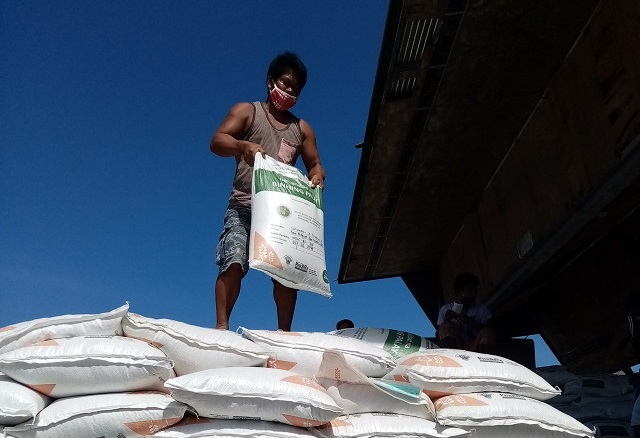
Amidst mobility limitations, more than 60k farmers in South and Southwestern Tagalog had received certified inbred seeds from the Rice Competitiveness Enhancement Fund-Seed Program spearheaded by Department of Agriculture-Philippine Rice Research Institute (DA-PhilRice) in Los Baños, Laguna.
While complying with the Inter-Agency Task Force guidelines, DA-PhiRice in Laguna delivered about 200,000 bags of certified inbred rice to 104 municipalities/cities in CALABARZON and MIMAROPA.
As farmers listed in the Registry System for Basic Sectors in Agriculture are prioritized, the station encouraged members of indigenous groups including the Alangan tribe of the Mangyans in Santa Cruz, Occidental Mindoro who received their preferred high-quality seeds from the program. Farmers chose what varieties to plant from national and regional recommendations: NSIC Rc 216, Rc 160, and PSB Rc 18.
In Lucban, Quezon, Mauro Romana, President of Samahang Magpapalay sa Samil, shared that they already had shifted from using traditional to modern varieties. With the use of high-quality seeds from the RCEF-Seed Program, Lucban farmers increased their yield from 3 tons to at least 4 tons per hectare.
“Yield is low with the traditional rice varieties no matter what we do. In the wet season, we planted NSIC Rc 216 and 160, which are high-yielding and consumer-preferred. RCEF gave us immediate access to modern high-yielding varieties,” he said.
Aside from seeds, about 44,000 brochures on modern rice farming were distributed under the RCEF-Rice Extension Services Program. The brochure contains comprehensive guide from land preparation, fertilizer application, to harvesting.
Distribution of rice production information materials is expected to be amplified this coming dry season.
RCEF, which is a
component of Republic Act 11203 or Rice Tariffication Law signed by Pres.
Rodrigo Duterte, allots P10 billion fund every year for the rice farmers.
Sponsored by Sen. Cynthia Villar, the program is a six-year government
initiative to help the farmers compete in the international rice market. The
local government units and lawmakers assist in its implementation.
PhilRice leads the RCEF-Seed Program and is the government’s lead agency on rice research and development mandated to help ensure a rice-secure Philippines. With eight stations across the country, its programs and projects are in line with the DA’s “Masaganang Ani, Mataas na Kita” battlecry. For more information about the Institute’s program, queries can be sent thru PhilRice Text Center (0917 111 7423) or email prri.mail@philrice.gov.ph.




